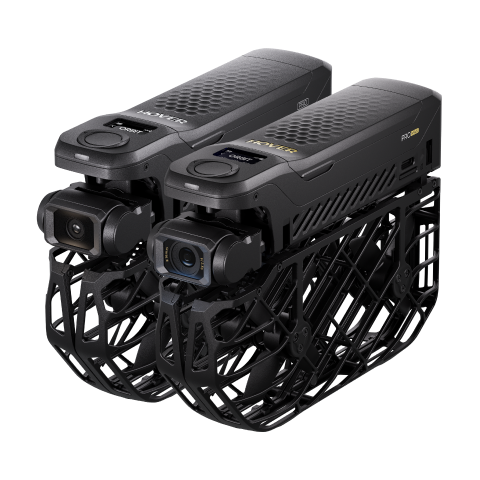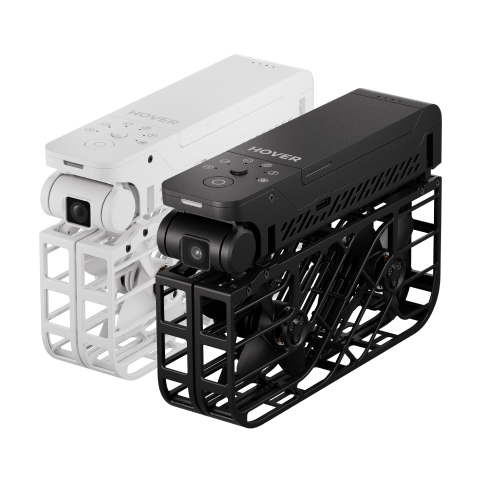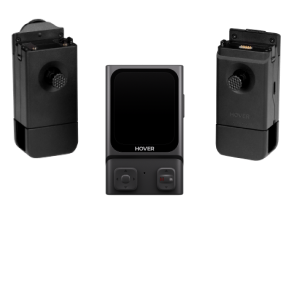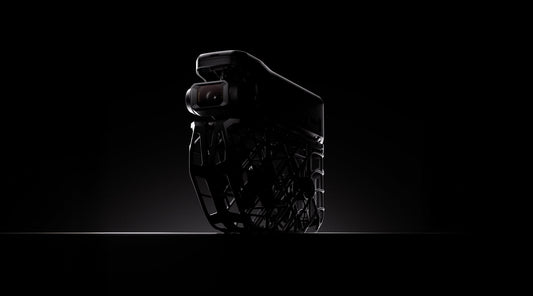Before X1 PROMAX, capturing 8K aerial videos was challenging for general consumers. Professional camera drones and equipment were often too expensive and cumbersome, typically requiring a full production team. However, not every project needs a large crew or complicated gear. Sometimes, you want to capture stunning footage while traveling solo, or you're a videographer or small studio looking to offer top-tier videos with unique aerial perspectives.
HOVERAir X1 PROMAX changes the game. With its pocket-sized design, weighing just 192 grams, and easy-to-use automatic and manual controls, it takes off in seconds, allowing you to shoot in 8K anytime, anywhere.
What is 8K?
8K is a video resolution standard, alongside other common resolutions like 720P, 1080P, 2K, and 4K.
- 720P and 1080P refer to the number of vertical pixels in the video, with 720P offering 1280x720 pixels and 1080P providing 1920x1080 pixels.
- In contrast, 2K, 4K, and 8K are named after their horizontal pixel count. 2K has approximately 2048x1080 pixels, 4K offers 3840x2160 pixels, and 8K delivers an impressive 7680x4320 pixels.
8K video resolution, with around 33.2 million pixels per frame, represents the cutting edge of ultra-high-definition(UHD) technology. It boasts 4 times the detail of 4K (3840x2160 pixels) and 16 times that of Full HD (1920 x 1080 pixels), making it ideal for large screens and high-end viewing experiences where ultra-fine detail and stunning clarity are essential.

For context, most current desktop monitors offer 1080p or 4K resolution, while high-end smartphones typically feature displays ranging from 1080p to 2K (2560 x 1440 pixels). The iPhone 14 Pro, for instance, has a resolution of 2556 x 1179 pixels. This comparison gives you a sense of just how much more detail 8K captures.

Watch 8K videos shot on HOVERAir X1 PROMAX Download sample footage here. Note: HOVERAir X1 PROMAX provides H.264 and H.265 MP4 video formats.
What are the benefits of shooting in 8K?
While even many commercial Hollywood films are still filmed on 4K, filming in 8K can have its benefits.
Next-Level Clarity
With 8K resolution, every frame is packed with an extraordinary level of detail. Compared to 4K, 8K quadruples the resolution, enabling stunning visuals even on large cinema screens. When capturing large scenes, 4K may lose some details or exhibit color distortions. Due to its lower pixel density, 4K may not be clear enough for displaying fine patterns. In contrast, 8K, with its higher pixel density, can show richer details and more realistic images, whether you are watching movies or browsing pictures.
Enhanced Flexibility in Shooting and Editing
One of the biggest benefits of shooting in 8K is the creative flexibility it offers during editing. You can crop or zoom into smaller sections while keeping excellent detail, reframe shots as needed, integrate visual effects smoothly, and future-proof your content for higher-resolution displays—all without losing image quality. This is especially useful when you want to focus on a specific detail or subject within a scene.
For example, if you shoot a wide-angle shot, you can later zoom in to create a close-up, maintaining the clarity and sharpness that would be lost with lower resolutions. The ability to reframe shots during post-production also lets you adjust the composition to fit the story or aesthetic you're aiming for. Whether you're shifting focus or correcting framing errors, 8K gives you the resolution you need to make these changes seamlessly.
More Than 8K
The X1 PROMAX not only supports 8K video recording but also features a custom 7-layer lens for outstanding clarity and vibrant colors. It offers 14 stops of dynamic range and a 107° field of view, ensuring stunningly detailed and dynamic shots. For still photography, X1 PROMAX supports output in both JPG and RAW (DNG) formats, with resolutions of 12MP and 48MP.
How to Capture 8K Videos Using X1 PROMAX
You can either shoot in 8K using automatic flight modes or manual control.
- Open the Hover App: Navigate to settings on "Hover" page

- Tap "Hover Settings" and select 8K. Choose your preferred video codec: H.264 or H.265. Your videos will be saved in MP4 format.


Under manual control, you can tap this icon to select 8K as the video resolution and adjust ISO, EV, and shutter speed here. You can also switch ND filters depending on the lighting conditions and the visual effects you want to create.

- Start Recording: Press the power button or speak to the device to takeoff and start shooting at 8K@30fps.
- Download your videos using these methods:
- Open the HOVER X1 App, connect to the flight camera, and download the videos.
- Use a USB-C data cable to connect the device and your computer while the device is on, and download the videos directly.
- The PRO and PROMAX support up to 1TB SD cards, so you can also remove the SD card and transfer videos that way.
X1 PROMAX supports extra SD cards up to 1TB to handle the large file sizes of 8K footage. We recommend having at least 16GB of storage available when shooting in 8K. A one-minute 8K video shot on X1 PROMAX is approximately 1-2GB.
How to Edit 8k Videos
Editing 8K videos is demanding. The large file sizes and high-resolution footage require both powerful software and hardware—most everyday laptops aren't up to the task. To edit 8K videos smoothly, you'll need a computer with a powerful CPU and GPU. For example, many high-end Apple laptops, like the MacBook Pro with M3 Pro/M3 Max chips, are capable of 8K editing due to their optimized hardware and software integration.
For Windows, we recommend using a computer equipped with at least an Intel i7 CPU, an NVIDIA RTX 3080 GPU, and a minimum of 32 GB of RAM. You'll also need a professional editing suite, such as Adobe Premiere Pro, Final Cut Pro, or DaVinci Resolve. These programs support 8K workflows, but your system needs to meet certain specs for a smooth editing experience.
How to Share Your 8K Videos?
While filming in 8K offers great flexibility in editing and stunning resolution, the final output doesn't need to be 8K, especially since many streaming platforms don't support that resolution. You can easily export the video in 4K or lower after editing and still enjoy incredible clarity.
If you want to share the original 8K videos, we recommend using cloud services like Dropbox or Google Drive to upload the full-resolution file. While platforms like YouTube and Vimeo support 8K uploads, viewers will typically only be able to watch in 4K. Shooting in 8K with the X1 PROMAX delivers incredible video quality, great post-production flexibility, and stunning aerial perspectives.
Apart from 8K, X1 PROMAX also supports 4K@60fps in HDR (10-bit HLG) and 4K@120fps slow-motion, making it ideal for capturing breathtaking action shots and cinematic footage. Now, go ahead and try it out! Shoot in 8K and watch your videos come to life with incredible detail, vibrant colors, and an epic aerial third-person view.
Edited History:
Removed information about future OTA release of DNG on August 7, 2025.


















3件のコメント
Please update the app so it first opens to the settings and album page, instead of seeing everyone else’s videos. Very annoying that the home button doesn’t take you to your drone.
This feature will be available in a few weeks — stay tuned!
When will you release the .DNG / RAW update for photos? Waiting since 10.2024 now.